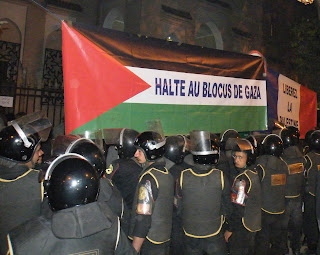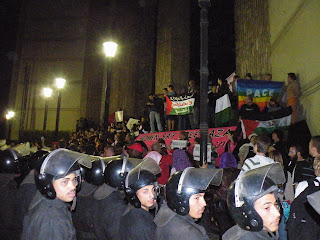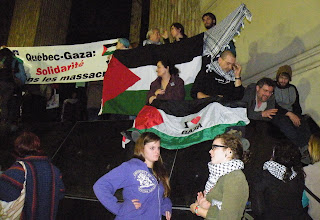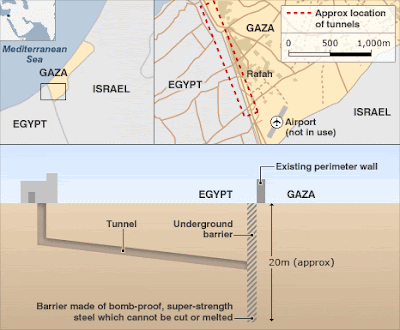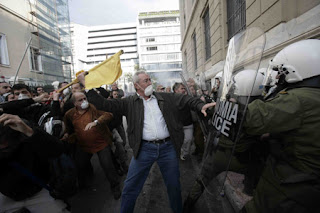NEW TIMES - PHOENIX NEWS BLOGThe Anarchists Own the Nazis, and the Nazis Cause a Car Wreck as They AmscraySun., Nov. 8 2009
By
Stephen Lemons in Feathered Bastard
Some 150 anarchists and other counter-demonstrators showed their mettle yesterday afternoon against a troop of around 60 neo-Nazis, mostly from out-of-state, who marched from 12th Avenue and Adams down to the Arizona state Capitol, flipping sieg heils and crying, "White power" all the way. The anarchists, who made up the majority of the counter-protesters, met the swastika-flag-wielding National Socialist Movement members at 15th Avenue and Washington, and followed them down to the state Senate lawn at 17th Avenue and Jefferson.

About 100 Phoenix Police officers, some of them on horseback, kept the peace by enforcing a distance between the two groups. Although a couple of plastic bottles were thrown at one point, the only casualty for the NSMers came as a result of their own error, when they caused an accident at 7th Avenue and Van Buren in one of the rental cars they left in after the demo. An unidentified Nazi was rushed away in an ambulance for an injury to his leg. Phoenix Police Sgt. Brian Murray confirmed at the scene that the accident was the fault of the Nazis, whose small white car collided with a large red truck.
None of the Nazis were taken into custody, though the truck's driver was arrested for not having I.D. and proof of insurance. Murray said the arrested driver would be ticketed and released as long as he had no outstanding warrants. The driver of the Nazi car was ticketed as well, but according to NSM spokesman Charles Wilson, the Nazi wheel man refused to sign the citation. Wilson later blamed the accident on the police, saying the cops were supposed to have kept the street clear for the Nazis' exit.
Hey, at least Wilson didn't blame it on the Jews.
Other than this accident, the day's events were full of noise and posturing and not much else. Three armies dressed in black did their kabuki dance: the cops,the stormtroopers, and the anarchists. Some of the Nazis bore red shields with the NSM logo and the swastika. Others carried Nazi flags, Confederate flags, or American flags perversely altered to represent the National Socialist Movement. The Nazis had a drummer keeping time as they marched and chanted slogans such as "Whose streets? Our streets," and "No reds, no Jews, the Mexicans must go, too."
The Nazis goose-stepped down the south side of Washington, while the anarchists took the north sidewalk, with a platoon of Phoenix's finest marching down the street's middle. The anarchists taunted the Nazis with chants such as "Nazis go home," and "No racists, no classes, no motherfucking fascists." They held signs and placards that read "Fuck you, Nazis," "Nazis stay out of Phoenix," or just swastikas with red lines marked through them. Many wore bandannas to hide their identities, and many waved black flags, beat drums or shook handmade rattlers.

I spotted local neo-Nazis Harry Hughes and Scott Hume in the mix, as well as J.T. Ready, comically wearing some furry Tyrolean hat. I asked NSM "commander" Jeff Schoep why he was only able to produce less than half of the promised 200 Nazis he'd bragged to authorities he was bringing. He sputtered something about the police "protecting" the anarchists, whom he referred to as "your friends." (Schoep is no great communicator.) In reality, there was little doubt about who the cops were protecting. If I even got close to the wannabe shutzstaffels they whined to the police that I was provoking them. What babies.
On the lawn of the Capitol, with a cordon of cops ringing them, the Nazis acted like, well, Nazis. Some ripped up Mexican flags, spat on them, and wiped their rears with the remnants. I heard one tatted-up skinhead yell to a man in the crowd, "You'd make a nice lampshade." Many dared the anarchists to cross the police line, calling them "faggots," though these steel-toed boot boys seemed in no rush to do so themselves.
As for the counter-protesters, they kept up a constant volume of noise to drown out the blackshirts' speeches. At one point, they chanted, "Hey, neo-Nazi, you're an immigrant, too." At another, they cried, "Follow your leader and kill yourself." There were also plenty of plain ol' "Fuck you, Nazis" and "Get the fuck out," punctuated by middle fingers.

About a half-dozen Nazi leaders addressed the enraged counter-demonstrators, beginning with Schoep, who was easily the least inspiring of the bunch. How this nudnik got to be the head of NSM, I don't know, but it was not because of his speaking skills. That's for sure. Skinny and pale, he doesn't look like he'd be able to last very long in any sort of street brawl. Hardly an exemplar of the master race.
"We will not be shouted down," Schoep declared, as he was being shouted down.
Later, harping on the day's anti-immigrant "America First" theme he spouted this unoriginal malarkey, "An illegal is an illegal. You break the laws of this country, you go home. We stand here for truth, justice and the American way, and to give our children, our people, a chance in this nation."
This from a guy who, according to the Southern Poverty Law Center, had four kids in a car with him while his daughter's mom ripped off $4,000 in computer equipment.
Outfitted in a period S.A. costume, former NSM fuhrer Clifford Herrington briefly praised National Socialism in Spanish, then continued, "The Mexican government is the enemy of all working class people everywhere. Ninety percent of the real value of Mexico...is owned by Jewish [capitalists]. They want you here causing problems with us because America is so much better, because our wages are so much better. And they use you to break up the working class in this United States."
In other words, it's all because of the Joos. These nimrods deny the Holocaust, yet continue to scapegoat its victims. If these lumpen boobs had their way, they'd kill another six million, and then some.
The biggest freak to spit at the mic -- and I mean, literally spit at it -- was Texas swastika-sniffer Victor Jeffcoat. Raving, with twisted features, Jeffcoat denounced the "decadence" of those heckling him, declaring that he had served in the armed forces, and they hadn't.
"You're nothing more than the puppets of foreign bankers," screamed Jeffcoat, saliva oozing from the sides of his mouth.
He added, "You do not deserve to speak. You never served. You never suffered. Your suffering is without drugs. Your suffering is without sex. Your debaucherous behaviors...your sick behaviors...you create your porn, you create your sickness, you spread it like a cancer..."
Wacky. Remedial education and heavy psychotropic drugs might actually help Jeffcoat form coherent thoughts one of these days. Otherwise, a rubber room and a shirt with wraparound sleeves could do wonders.
Though J.T. Ready hogged the news cameras, giving TV crews an impromptu press conference as his comrades spoke, I had the impression that the NSMers were not happy with the twice court-martialed Ernst Roehm of the East Valley. He was given little time to speak, and his remarks were perfunctory, and hardly as rabble-rousing as his speech back in 2007 before a group of nativists on the Capitol lawn, with his pal state Senator Russell Pearce applauding him from the sidelines.
J.T. was present later at the accident, where I asked him if he supported Sheriff Joe Arpaio.
"Absolutely," he replied.
Indeed, Arpaio knows who J.T. is, and greeted him by name at the May 2 counter-demonstration to the Walk for Respect to Joe's jails. That's the same counter-demo where Arpaio stopped to give the Nazis a photo op, and passed on intelligence as to the location of the anti-Arpaio protesters.
Following the demo, the police and the anarchists escorted the Nazis east, and on to the spot where they'd parked their cars. The Nazis wouldn't tell me where their swastika-burning after-party was going to be, though I heard later that it was taking place somewhere in Maricopa city, perhaps at the home of neo-Nazi Harry Hughes. I was not able to confirm this, but I was able to confirm J.T.'s personalized license plate: "NSM USA." That's odd, as he continues to deny he's a member of NSM.
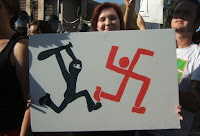
NSM spokesman Charles Wilson played coy with me about the after-party location as we talked later on the phone. He asked me why I wanted to know. I explained that I'd like to tell the anarchists where it was going to be. He laughed. Wilson might seem deranged in his public persona, but on the phone, he was quite civil, and we engaged in a brief debate over the lunacy of marching through the streets in 2009 AD with a swastika flag as your banner. At least, it seems pretty dang cuckoo to me.
Overall, it was a good day for the anarchists. None of them were arrested, injured or cited. They outnumbered the Nazis over two-to-one, and they showed that some Phoenicians are willing to physically oppose crazed Hitler-worshipers traipsing through town with symbols of hatred. Whatever bad rep the anarchists had before Saturday -- deserved or undeserved -- has now been absolved.





